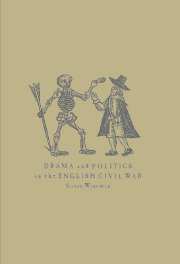Book contents
- Frontmatter
- Contents
- List of illustrations
- A note on texts and list of abbreviations
- Acknowledgements
- Preface
- Introduction: how the drama disappeared
- PART I 1642–1649: CASES IN POLITICS AND DRAMA
- Interchapter: ‘The life of action’: playing, action and discourse on performance in the 1640s
- PART II THE 1650S: PROTECTORATE, POLITICS AND PERFORMANCE
- 4 Gender and status in dramatic discourse: Margaret Cavendish, Duchess of Newcastle
- 5 Royal or reformed? The politics of court entertainment in translation and performance
- 6 National identity, topic and genre in Davenant's Protectorate opera
- 7 Genre, politics and place: the social body in the dramatic career of John Tatham
- 8 True and loyal? Politics and genre in Civil War and Protectorate tragicomedy
- Coda
- Notes
- Select bibliography
- Index
5 - Royal or reformed? The politics of court entertainment in translation and performance
Published online by Cambridge University Press: 20 August 2009
- Frontmatter
- Contents
- List of illustrations
- A note on texts and list of abbreviations
- Acknowledgements
- Preface
- Introduction: how the drama disappeared
- PART I 1642–1649: CASES IN POLITICS AND DRAMA
- Interchapter: ‘The life of action’: playing, action and discourse on performance in the 1640s
- PART II THE 1650S: PROTECTORATE, POLITICS AND PERFORMANCE
- 4 Gender and status in dramatic discourse: Margaret Cavendish, Duchess of Newcastle
- 5 Royal or reformed? The politics of court entertainment in translation and performance
- 6 National identity, topic and genre in Davenant's Protectorate opera
- 7 Genre, politics and place: the social body in the dramatic career of John Tatham
- 8 True and loyal? Politics and genre in Civil War and Protectorate tragicomedy
- Coda
- Notes
- Select bibliography
- Index
Summary
The theory and practice of ‘reformed’ drama in the 1650s can be mapped in relation to both the contemporary political situations and the pre-war Caroline court. While Margaret Cavendish was writing and watching performances in exile, this story begins with an entertainment recorded as having been performed under the Commonwealth, before a visiting ambassador, and continues in the theorising about the place of reformed drama and opera which took place under the Protectorate.
Despite stylistic differences, in ideological terms masque and opera seem to have held comparable places in the theatrical debates of the 1650s, and in some cases the two words seem to cover similar material. For the purposes of this argument, which traces the interconnections of political circumstance and a genre, masque and opera function primarily as the locus of the debates about drama and theatre under the Protectorate. This chapter discusses the contextual and political implications of the genres and the way musical entertainment was part of the cultural and ideological disputes of the 1650s rather than the musical developments of the aria and recitative within the opera, or performance in masque, though in performance music would have played an important part in the drama, and would have complicated and elucidated the narrative.
In 1653 the entertainment Cupid and Death was permitted, even sponsored, by the government. The government itself changed rapidly in 1653-4 when Cromwell dissolved the unpopular Rump and summoned a Nominated Assembly (better known as Barebones).
- Type
- Chapter
- Information
- Drama and Politics in the English Civil War , pp. 114 - 136Publisher: Cambridge University PressPrint publication year: 1998



